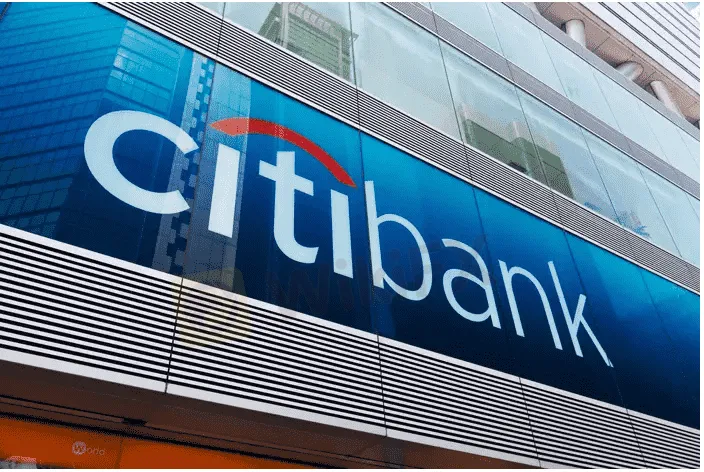简体中文
繁體中文
English
Pусский
日本語
ภาษาไทย
Tiếng Việt
Bahasa Indonesia
Español
हिन्दी
Filippiiniläinen
Français
Deutsch
Português
Türkçe
한국어
العربية
Citibank & Swiss Company METACO to Develop Institutional Crypto Custody
Abstract:This partnership will further Citibank toward developing and piloting digital asset custody capabilities using METACO’s technology.

Citibank will be leveraging METACOs digital asset custody and orchestration platform.
Citi Securities Services already has over $27 trillion worth of AUM.
The global crypto market cap is stuck under $900 billion.
The growth of the crypto market has been significantly successful, but it is yet to reach the mainstream audience entirely. Citibank is ensuring that happens using its reach, and the most recent partnership is another step in that direction.
Citibank X METACO
The global bank announced in a press release its partnership with the Switzerland-based technology company METACO to develop Institutional Digital Asset Custody potential for its users.
The seven-year-old Swiss company‘s bank-grade digital asset custody and orchestration platform Harmonize will be integrated into Citi’s existing infrastructure.
This will allow Citi to develop and pilot digital asset custody capabilities and also use its expansive custody network to enable clients to store and settle digital assets.
Commenting on this partnership, the Global Head of Securities Services at Citi, Okan Pekin, said,
“We are witnessing the increasing digitization of traditional investment assets along with new native digital assets. We are innovating and developing new capabilities to support digital asset classes that are becoming increasingly relevant to our clients.”
Citi Securities Services already has over $27 trillion worth of assets under its custody, administration, and trust. At the same time, METACO has been an important figure in several key implementations, including FINMA, BaFin, FCA, Banco de España, and MAS-regulated institutions.
The Crypto Market Takes a Dip
While the partnership is beneficial to both companies, the decision came at a time when the entire crypto market has been in an iffy spot.
After losing more than $435 billion this month, the crypto market cap fell under $1 trillion and is currently at $879 billion.

Although mixed signals regarding recovery have been visible for a while now, the volatility visible on-chain makes it difficult for the market to stick to one path.
Thus when the market could reclaim the $1 trillion is unknown, but investors still happen to remain hopeful.

Disclaimer:
The views in this article only represent the author's personal views, and do not constitute investment advice on this platform. This platform does not guarantee the accuracy, completeness and timeliness of the information in the article, and will not be liable for any loss caused by the use of or reliance on the information in the article.
Read more

The Ultimate Guide to Automated Forex Trading in 2025
Modern markets are revolutionized by automated trading systems, which now execute 70-85% of all transactions. These advanced automated trading software solutions, commonly called trading robots or Expert Advisors (EAs), leverage algorithmic precision for automatic trading across forex, stocks, and commodities 24/7. By removing emotional interference and executing trades in microseconds, auto forex trading platforms create fair opportunities for all market participants. For those new to automated trading for beginners, these systems provide disciplined, backtested strategies while significantly reducing manual effort.

Will natural disasters have an impact on the forex market?
The forex market is known for its rapid responses to global events, but the influence of natural disasters, such as earthquakes and typhoons, can be less straightforward. While headlines may scream about catastrophic damage and economic disruption, the long-term effects on currency values often depend on a blend of immediate shock and underlying economic fundamentals.

Philippines Deports 29 Indonesians Linked to Online Scam Syndicate in Manila
Online scam groups in the Philippines trick Filipinos into gambling and love scams, from Manila to Bacolod, causing trafficking and pain as police fight back.

Why does your mood hinder you from getting the maximum return from an investment?
Investment decisions are rarely made in a vacuum. Aside from the objective data and market trends, our emotions—and our overall mood—play a crucial role in shaping our financial outcomes. Whether you’re feeling overconfident after a win or anxious after a loss, these emotional states can skew your decision-making process, ultimately affecting your investment returns.
WikiFX Broker
Latest News
How Crypto Trading Transforms FX and CFD Brokerage Industry
UK would not hesitate to retaliate against US tariffs - No 10 sources
FCA Warns Against 10 Unlicensed or Clone Firms
CySEC Warns Against 14 Unlicensed Investment Websites
Top Currency Pairs to Watch for Profit This Week - March 31, 2025
Will natural disasters have an impact on the forex market?
Philippines Deports 29 Indonesians Linked to Online Scam Syndicate in Manila
Navigating the Intersection of Forex Markets, AI Technology, and Fintech
Exposed: Deceptive World of Fake Trading Gurus – Don’t Get Fooled!
AI-Powered Strategies to Improve Profits in Forex Trading
Currency Calculator







